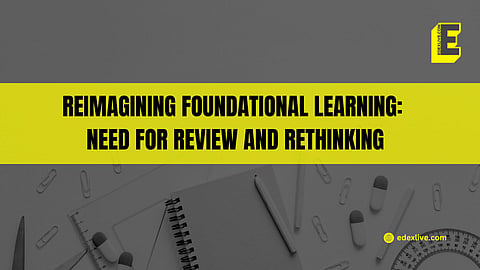

India has one of the largest school footprints in the world with 1.5 million schools (government and private), 265 million students and 9,507,123 teachers. (UDISEPlus, 2021-22).
Given that gross enrollment ratio at primary level was more than 100 in 2022 with India having reached almost universal enrollments at the primary level, the country has shifted efforts to ensure that all children in school receive quality education to meet Sustainable Development Goal 4 (SDG 4.1) that is “by 2030, ensure that all girls and boys complete free, equitable and quality primary and secondary education leading to relevant and effective learning outcomes.”
There is a major concern globally related to ‘learning poverty’ given that 53 percent of children in low- and middle-income countries were living in Learning Poverty, that is, they were unable to read and understand a simple text by age 10 (World Bank, 2021).
The National Education Policy (NEP) 2020 has in turn focussed on the ability of children to read and write and perform basic operations of numeracy as foundational skills for future schooling and lifelong learning.
The Government of India has therefore given the highest priority to achieving universal literacy and numeracy at end of Grade III by 2026-27 by launching the National Initiative for Proficiency in Reading with Understanding and Numeracy (NIPUN Bharat) in a Mission mode in 2021.
While these academic competencies are undoubtedly important for future learning, a major gap exists with no focus on social emotional skills which are a critical competent of the building blocks which form ‘foundational learning’.
Social-emotional skills are an umbrella term for intra- and inter- personal competencies that enable children to understand and regulate emotions as well as participate in positive social interactions ( Denham et al, 2014 ). A significant body of research demonstrates that social–emotional competence is associated with emergent academic skills, particularly those belonging to disadvantaged backgrounds (Singh and Sarkar, 2015; Garcia, 2015; Blair & Raver, 2015; Macmillan et al., 2004).
A large-scale Foundational Learning Study (FLS, 2022) conducted in 2022 by the Ministry of Education with the National Council of Educational Research and Training (NCERT) covered approximately 85,000 Grade 3 students to track their numeracy and literacy in 20 Indian Languages. The study found that as more than 60% of Grade 3 students in states and UT;s such as Tamil Nadu (77%), Nagaland (72%) Jammu and Kashmir (62%), Gujarat(62%) and Chandigarh (61%) did not meet the global mimimum proficiency related to numeracy while in English oral reading awareness with comprehension, 46 per cent of students across 37 states /UT’s, did not meet global proficiency levels.
Education in its broadest terms must be able to transmit values, beliefs and skills that support and maintain a society and its positive culture and cannot be seen from a limiting lens.
Clearly we need to ensure that we do not ignore supporting development of social-emotional competencies during early years, since it will enable children to engage fully in learning and create and sustain meaningful relationships with others, including empathy, cooperation, perspective-taking, and the capacity to manage strong emotions and inhibit impulsive behaviors including self-regulation and executive functions.
There is, therefore, an urgent need to review and rethink foundational learning as going beyond literacy and numeracy to include social-emotional competencies in order to meet the goals of lifelong learning as envisioned in NEP 2020.
(Dr Renu Singh is the Executive Director of Young Lives India. Views expressed are her own.)
